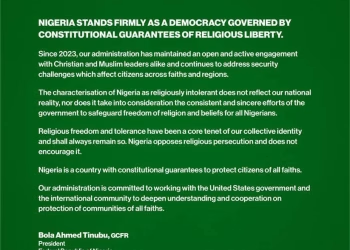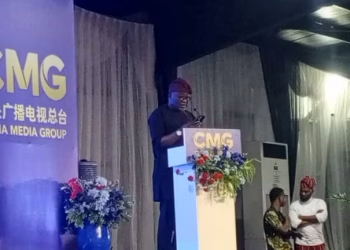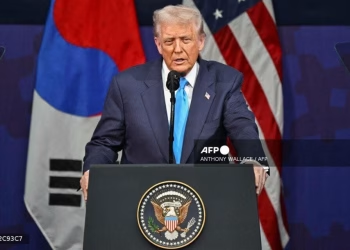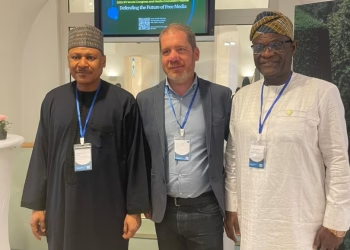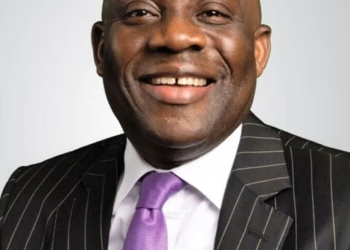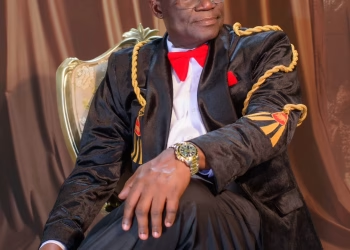Speech Delivered by Dr. Akinwumi A. Adesina President, African Development Bank Group Inauguration Lecture for the New President of Nigeria 27 May 2023, Abuja, Nigeria
The election of a new President always elicits hope
Your Excellencies,
I wish to thank President Muhammadu Buhari for his personal invitation to me to attend the ceremonies for the swearing-in of the incoming President-elect, H.E. Bola Ahmed Tinubu.
Congratulations Mr. President on Nigeria’s 7th consecutive democratic transition.
Congratulations to the incoming President and Vice President.
I wish to thank the Secretary to the Government of the Federation, Boss Mustapha, Chairman, and members of the Presidential Transition Council, for inviting me to speak at this inauguration lecture for the incoming President of Nigeria.
It is such a great honor, to share my views and perspectives, as the nation gets ready to have a passing of the baton between H.E. President Muhammadu Buhari, and the incoming-President, H.E. Asiwaju Bola Ahmed Tinubu.
It is your turn!
I wish to congratulate you Mr. President for your stewardship of Nigeria for the past eight years. Thank you very much for all your strong support for me, as President of the African Development Bank Group.
Without your strong support for me in 2015, and then in 2020, I would not have been President of the African Development Bank. There is a saying that “anyone that is sent on an errand must come back and report to the one who sent him or her.” Mr. President, you sent me on an errand, and I am here to give you a report.
I am pleased to let you know that the African Development Bank was ranked this year by Publish What You Fund as the “Most Transparent Institution in the World.”
The African Development Bank was ranked last year by the Washington D.C.-based Center for Global Development as the “Best Multilateral Development Bank in the World”.
Dear Mr. President, as you leave, you can take pride that the mission for Africa is being well executed.
I wish to congratulate the incoming President, H.E. Bola Ahmed Tinubu, GCFR, who will take over the mantle of stewardship of Nigeria tomorrow.
I am delighted that my very dear friend and brother, President Uhuru Kenyatta, former President of Kenya was invited to deliver the inauguration lecture. He was a great leader for Kenya.
I am sure he must be wondering why there are two Kenyans on the same panel.
Well… I lived in Kenya for close to ten years.
I remember, one day when then President Goodluck Jonathan visited Kenya and I accompanied him as a minister, as the two Presidents were introducing members of their delegations, President Jonathan said, “Meet Dr. Adesina, Minister of Agriculture”, to which President Kenyatta responded, “Yes, Adesina is the Kenyan on loan to Nigeria as Minister.”
We all laughed!
Thank you, President Kenyatta, for your incredibly insightful and excellent speech.
Your Excellencies,
The election of a new President always elicits hope.
Nigeria will be looking to you, as President Tinubu, on your first day in office, with hope.
Hope that you will assure security, peace, and stability.
Hope that you will heal and unite a fractious nation.
Hope that you will rise above party lines and forge a compelling force to move the nation forward, with inclusiveness, fairness, equity, and justice.
Hope that you will drastically improve the economy.
Hope that you will spark a new wave of prosperity.
And hope must be brought to the present, as hope deferred makes the heart grow weary.
Your Excellencies,
The starting point must be macroeconomic and fiscal stability. Unless the economy is revived and fiscal challenges addressed boldly, resources to develop will not be there.
No bird can fly if its wings are tied.
Nigeria currently faces huge fiscal deficits, estimated at 6% of GDP. This has been due to huge federal and state government expenditures, lower receipts due to dwindling revenues from export of crude oil, vandalism of pipelines and illegal bunkering of crude oil.
According to Nigeria’s Debt Management Office, Nigeria now spends 96% of its revenue servicing debt, with the debt-to-revenue ratio rising from 83.2% in 2021 to 96.3% by 2022.
Some will argue that the debt to GDP ratio at 34% is still low compared to other countries in Africa, which is correct; but no one pays their debt using GDP.
Debt is paid using revenue, and Nigeria’s revenues have been declining.
Nigeria earns revenue now to service debt—not to grow.
The place to start is to remove the inefficient fuel subsidies.
Nigeria’s fuel subsidies benefit the rich, not the poor, fueling their and government’s endless fleets of cars at the expense of the poor. Estimates show that the poorest 40% of the population consume just 3% of petrol.
Fuel subsidies are killing the Nigerian economy, costing Nigeria $10 billion alone in 2022. That means Nigeria is borrowing what it does not have to if it simply eliminates the subsidies and uses the resources well for its national development.
Rather, support should be given to private sector refineries and modular refineries to allow for efficiency and competitiveness to drive down fuel pump prices. The newly commissioned Dangote Refinery by President Buhari—the largest single train petroleum refinery in the world, as well as its Petrochemical Complex—will revolutionize Nigeria’s economy.
Congratulations to Aliko Dangote for his amazing $19 billion investment!
Your Excellencies,
There is an urgent need to look at the cost of governance.
The cost of governance in Nigeria is way too high and should be drastically reduced to free up more resources for development. Nigeria is spending very little on development.
Today, Nigeria is ranked among countries with the lowest human development index in the world, with a rank of 167 among 174 countries globally, according to the World Bank 2022 Public Expenditure Review report.
To meet Nigeria’s massive infrastructure needs, according to the report, will require $3 trillion by 2050. According to the report, at the current rate, it would take Nigeria 300 years to provide its minimum level of infrastructure needed for development.
All living Nigerians today, and many generations to come, will be long gone by then!
We must change this. Nigeria must rely more on the private sector for infrastructure development, to reduce fiscal burdens on the government.
Your Excellencies,
Much can be done to raise tax revenue, as the tax-to-GDP ratio is still low.
This must include improving tax collection, tax administration, moving from tax exemption to tax redemption, ensuring that multinational companies pay appropriate royalties and taxes, and that leakages in tax collection are closed.
However, simply raising taxes is not enough, as many question the value of paying taxes, hence the high level of tax avoidance. Many citizens provide their own electricity, sink boreholes to get access to water, and repair roads in their towns and neighborhoods.
These are essentially high implicit taxes.
Nigerians therefore pay the highest ‘implicit tax rates’ in the world.
Governments need to assure effective social contracts by delivering quality public services. It is not the amount collected, it is how it is spent, and what is delivered. Nations that grow better run effective governments that assure social contracts with their citizens.
Your Excellencies,
We must rebalance the structure and performance of the economy.
A very common refrain in Nigeria, with every successive government, is “We need to diversify the economy.”
But is it so?
The economy of Nigeria is one of the most diversified in Africa, with the oil sector accounting for only 15% of the GDP, and 85% is in the other sectors.
Nigeria’s challenge is not diversification. Nigeria’s challenge is revenue concentration.
This is because the oil sector accounts for 75.4% of export revenue and 50% of all government revenue.
The solution, therefore, is to unlock the bottlenecks that are hampering 85% of the economy. These include low productivity, very poor infrastructure and logistics, epileptic power supply, and inadequate access to finance for small and medium-size enterprises.
Nigeria must also shift away from import substitution approach to export-focused industrialization. Nations do not thrive through import substitution; they thrive from export-bound industrialization.
Your Excellencies,
For faster growth, Nigeria must decisively fix the issue of power, once and for all.
There is no justification for Nigeria not having enough power.
The abnormal has become normal.
Nigeria’s private sector is hampered by the high cost of power. Providing electricity will make Nigerian industries more competitive.
And it is not brain surgery.
Take two examples: Kenya and Egypt.
With the support of the African Development Bank, Kenya, under President Kenyatta, was able to expand electricity access from 32% in 2013 to 75% in 2022. What an incredible achievement within 10 years!
Today, 86% of Kenya’s economy is powered by renewable energy. And in one project—the Last Mile Connectivity Project—the Bank’s support allowed Kenya to connect over 2.3 million poor households to electricity—that is over 12 million people provided with affordable connection to grid power.
In 2014, Egypt had electricity deficit of 6,000 megawatts, but by 2022 it had 20,000 megawatts of surplus power generation capacity. Amazing!
I commend the Government of Nigeria on the recent commissioning of the several power projects. But there is still much to do.
Nigeria should invest massively in renewable energy, especially solar. The African Development Bank is implementing a $25 billion Desert-to-Power program to provide electricity for 250 million people across the Sahel, including the northern parts of Nigeria.
Your Excellencies,
For inclusive development, Nigeria must completely revive its rural areas.
Nigeria’s rural areas are forgotten and have become zones of economic misery.
To revive and transform these rural economies, we must make agriculture their main source of income, a business and a wealth creating sector. To be clear, agriculture is not a development sector. Agriculture is a business.
The development of Special Agro-industrial Processing Zones will transform agriculture, add value for agricultural value chains and attract private sector food and agribusinesses into rural areas.
Special agro-industrial processing zones will help turn rural areas into new zones of economic prosperity and create millions of jobs.
The African Development Bank, Islamic Development Bank and the International Fund for Agricultural Development are currently supporting the implementation of a $518-million Special Agro-Industrial Processing Zones’ program in 7 states and the Federal Capital Territory.
We are ready to help expand this to every state in the country. We are equally ready to help revamp agricultural lending institutions to help modernize the food and agriculture sector.
Your Excellencies,
The best asset of Nigeria is not its natural resources; Nigeria’s best asset is its human capital. We must invest heavily in human capital to build up the skills Nigeria needs to be globally competitive, in a rapidly digitized global economy.
We must build world class educational institutions, and accelerate skills development in science, technology, engineering, and mathematics, as well as in ICT and computer coding, which will shape the jobs of the future.
Your Excellencies,
There is an urgent need to unleash the potential of the youth. Today, over 75% of the population in Nigeria is under the age of 35. This presents a demographic advantage. But it must be turned into an economic advantage.
Nigeria must create youth-based wealth.
We must move away from the so-called “youth empowerment programs”. Youths do not need handouts. They need investments. The current banking systems do not and will not lend to the youth. Special funds, while palliative in approach, are not systemic and are also not sustainable.
What’s needed to unleash the entrepreneurship of the youth in Nigeria are brand new financial ecosystems that understand, value, promote and provide financial instruments and platforms for nurturing business ventures of the youth at scale.
The African Development Bank and partners including Agence Francaise de Developpement and the Islamic Development Bank launched the $618 million I-DICE program to develop digital and creative enterprises. They will create 6 million jobs and add $6.3 billion to Nigeria’s economy.
Your Excellencies,
The African Development Bank is currently working with Central Banks and countries to design and support the establishment of Youth Entrepreneurship Investment Banks. These will be new financial institutions, run by young, professional, and highly competent experts and bankers, to develop and deploy new financial products and services for businesses and ventures of young people.
Several African countries plan to establish Youth Entrepreneurship Investment Banks.
Nigeria should establish the Youth Entrepreneurship Investment Bank.
Your Excellency, Mr. President-elect,
Nigeria’s economy needs to soar!
You have an opportunity to make history.
History by building a resurgent Nigeria.
A united and prosperous Nigeria.
It is Nigeria’s turn!
I wish you all the best for success.
May God bless—and help you.
And may God bless the Federal Republic of Nigeria.




